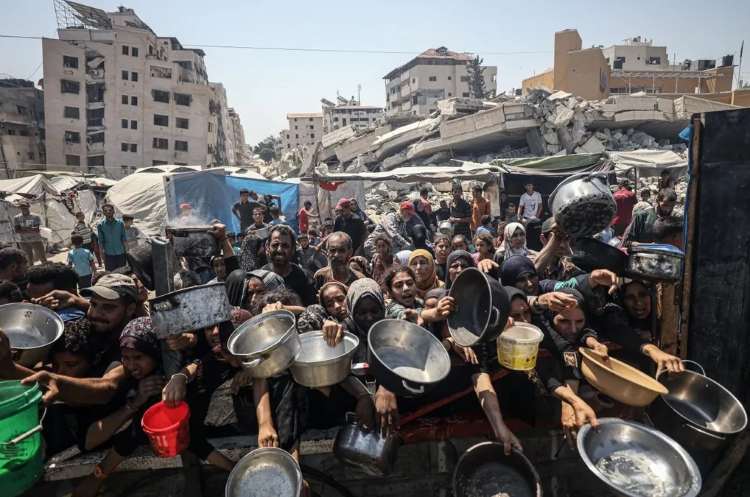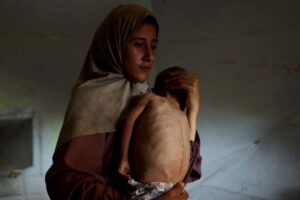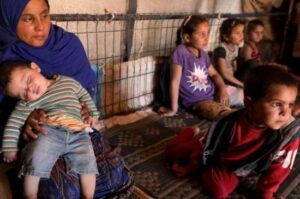
Gaza famine and global powers: The grainy television pictures that spurred Live Aid in 1985 seared the conscience of an earlier generation; today, sharper images of skeletal children in Gaza flash across smartphones yet provoke little more than a scroll. In July alone, the World Health Organisation recorded 63 of the year’s 74 malnutrition‑related deaths in the enclave, most of them toddlers and exhausted adults who never reached a functioning clinic. This is not crop failure but a siege‐induced famine engineered during a 22‑month war. Unless an indifferent international community reverses course, Gaza’s hunger will mark a lasting moral stain — one impossible to scrub from the record of global governance.
Famine indicators in Gaza now eclipse those that once shocked the world in Ethiopia. Nearly one in five children under five in Gaza City is acutely malnourished, and admissions for severe acute malnutrition have tripled since June. WHO data show that 5,000 young children sought outpatient care for wasting in the first two weeks of July; supplies for therapeutic feeding are projected to run out within weeks.
Hunger also stalks pregnant and breastfeeding women — 40 per cent are severely malnourished — compromising the next generation before birth. These statistics confirm that starvation is functioning as a weapon of war rather than an unfortunate by‑product of conflict.
READ I India must focus on depth of ties, not diversity
Aid denied, law defied
International law assigns the occupying power clear responsibility for civilian welfare. Yet Israel’s own “humanitarian hubs” force survivors to walk miles through active battle zones for a rationed meal, a system aid agencies warned would be dangerous and ineffective. Since May 27, more than 1,060 Gazans have been killed and 7,200 injured while merely trying to reach food distributions.

When trucks do enter, they are often sprayed with gunfire or mobbed by starving crowds, underlining the collapse of any orderly relief pipeline. The Associated Press reports that, despite Israeli claims to the contrary, WHO has counted 63 malnutrition deaths this month and the Gaza Health Ministry puts the toll even higher, at 82. The Geneva Conventions anticipated such scenarios precisely to prevent them; they now lie in tatters at each closed checkpoint.
The architecture of impunity
Legal accountability mechanisms have begun to stir. In November 2024 the International Criminal Court issued arrest warrants for Prime Minister Benjamin Netanyahu and former Defence Minister Yoav Gallant, alleging intentional deprivation of “objects indispensable to survival”. UN Secretary‑General António Guterres went further last week, branding Gaza “a moral crisis that challenges the global conscience,” and noting that more than 1,000 Palestinians have been killed while searching for food.

Yet warrants and condemnations have yet to translate into the one commodity children need most: calories. The gap between lofty jurisprudence and empty stomachs exposes the hollowness of a rules‑based order that cannot enforce its own rules.
The abdication of power
Cease‑fire diplomacy has stalled at the door of great‑power politics. The United States withdrew from Doha talks on 24 July, lamenting Hamas’s “bad faith” but applying no meaningful leverage on Israel to lift the siege. Meanwhile, Israeli domestic politics incentivise perpetual war: a Washington Post round‑table notes that Mr Netanyahu’s coalition depends on ultranationalist ministers who equate compromise with political suicide.
Public opinion in Israel is shifting toward a hostage‑for‑ceasefire deal, but electoral calendars, not humanitarian clocks, guide decision‑making. In effect, the guardians of the international system have normalised collective punishment by inertia—an abdication more damning than overt hostility.
Gaza famine — a path to redemption
Policy options are neither novel nor unattainable.
Unfettered aid corridors: A UN‑mandated air‑and‑sea humanitarian corridor, protected by peacekeepers and verified by satellite imagery, could move 500–600 truckloads daily—the minimum WHO deems necessary.
Conditional military assistance: Major arms suppliers should suspend transfers until independent monitors certify full compliance with international humanitarian law. Such conditionality proved effective in Sudan and can do so again.
Targeted sanctions and visa bans: The Dutch decision last week to bar two far‑right Israeli ministers is a template; coordinated sanctions across the EU‑US‑G20 spectrum would amplify pressure.
Swift ICC cooperation: States that trumpet a rules‑based order must pledge to execute ICC warrants should the named officials travel through their jurisdictions.
A reconstruction compact
An Arab‑led trust fund, backed by the EU, United States, and international financial institutions, should finance health‑care and nutrition services while empowering a reformed Palestinian Authority to administer them—an alternative both to Hamas domination and indefinite Israeli control, as analysts have argued.
The tools exist; only political will is missing. History remembers those who allowed Biafra, Rwanda, or Srebrenica to happen. If Gaza’s children are left to die for want of rice and rehydration salts, the shame will outlive the strategists who calculated it an acceptable cost.
A century hence, tribunals and textbooks will cite July 2025 as the moment the world saw deliberate famine in real time—and chose paralysis. Reversing that verdict demands urgent, collective action now.
